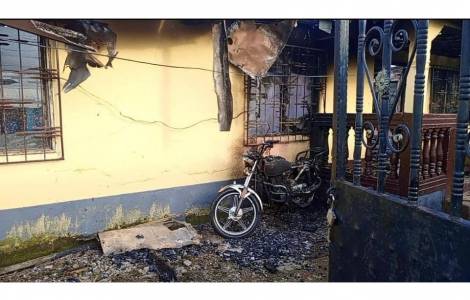
Yaoundé (Agenzia Fides) - At least 25 people were killed in western Cameroon on November 6, the day President Paul Biya celebrated the 41st anniversary of his rise to power. Paul Biya took control of Cameroon on November 6, 1982, two days after the resignation of his predecessor, Amadou Ahidjo, on November 4, 1982. At dawn on November 6, armed men attacked the village of Egbekaw, near Mamfe, killing 25 people, including 19 men, five women and an eight-year-old child. Nine people are seriously injured.
Egbekaw is located in southwest Cameroon, one of the two "English-speaking" regions of the country (along with the northwest). Since 2016, the two regions have been in the grip of a secessionist crisis born from the demand of local English-speaking populations to be able to use English instead of French in schools and courts. The conflict has since escalated since the separatists symbolically declared the independence of the two regions on October 1, 2017, grouped within Ambazonia (see Fides, 2/10/2017).
The Government of Cameroon condemned "the cowardly and despicable attack directed against innocent people by a gang of terrorists whose sole aim is to sow horror and desolation in families". The Communications Minister and government spokesperson says the attack was carried out by the separatist group Manyu Unity Warriors. A unit affiliated with the Ambazonian Defense Forces group. The choice of the day of the massacre by the group which carried it out was not made at random, according to local commentators. It aims to highlight the presence of separatists on the ground, who constitute a thorn in the side of Paul Biya, 90, while discouraging the local population from cooperating with Cameroonian security forces. The massacre was condemned by Aloysius Abangalo Fondong, Bishop of Mamfe, who said in a statement: "The massacre of human beings is an intrinsically evil act because it violates the fifth commandment of the Decalogue: 'Thou shalt not kill' (Ex 20:13; cf. Deut 5:17). The catechism of the Catholic Church clearly explains why it is unacceptable to kill a human being: "Human life is sacred because, from its beginning, it involves the creative action of God and remains forever in a special relationship with the Creator, who is its only end. God alone is the Lord of life from its beginning to its end: no one can, under any circumstances, assume the right to directly destroy an innocent human being".
"It is in this context of the sacredness of human life that we vehemently condemn the atrocious act which led to the destruction of the lives of so many innocent men, women and children", continues the statement of the Bishop of Mamfe, who presided over a Mass of suffrage for the victims. (L.M.) (Agenzia Fides, 8/11/2023)